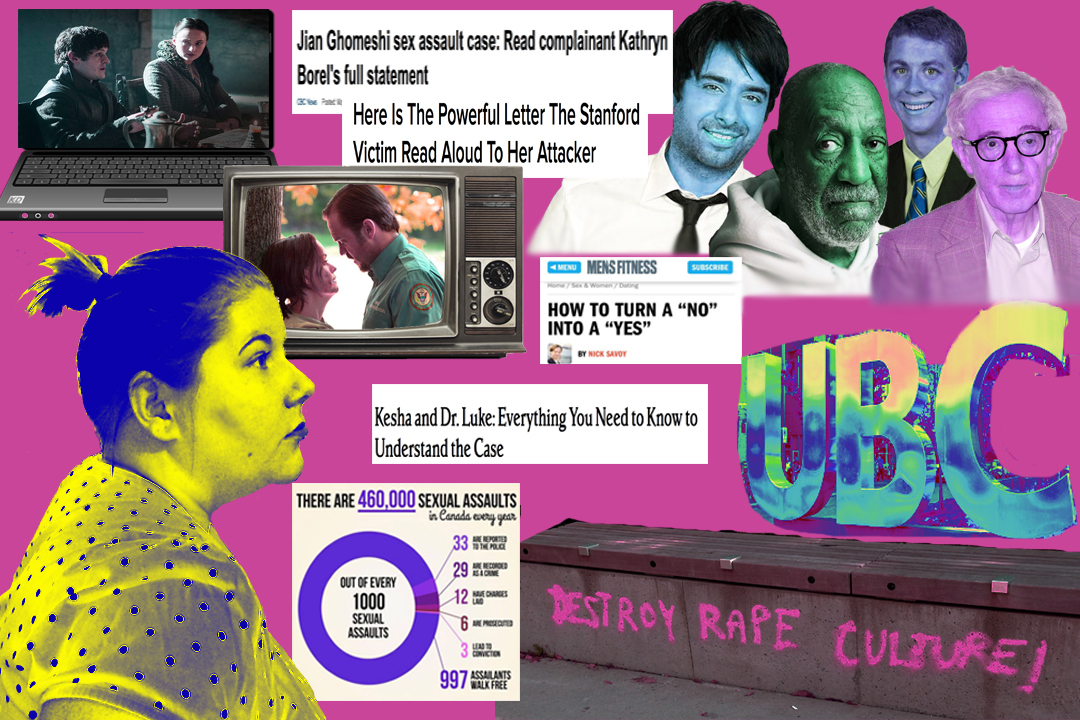Like this article? rabble is reader-supported journalism. Chip in to keep stories like these coming.
As a feminist and a journalist I often find myself reporting on and writing about sexual violence. While covering these topics can be tiring and upsetting, I feel blessed to have the opportunity to examine and combat rape culture in a public way.
The media has thankfully become more open to sharing stories about sexual violence in nuanced ways. And the mainstream is starting to wake up to how pervasive the problem really is.
Over the past year I have been covering a case close to home, the ongoing bungling of sexual assault cases at UBC. And more and more I find my personal life being inundated with stories and themes of rape. It has lead me to a lot of personal reflection.
From music, to movies and TV shows, to jokes and stories from friends, rape is everywhere I look. Recent examples that come to mind include a comedy show called Rape is Real and Everywhere, Orange is the New Black‘s latest season, Kathryn Borel’s powerful Canadaland interview, and Steven Galloway’s firing from UBC amid complaints that include sexual harassment.
Rape is so omnipresent that it begins to fade into the background. But when you begin to look critically at how rape permeates our society and affects our lives you realize that it’s not normal at all.
It’s not normal that women, especially trans* women, and women of colour have internalized the ever present threat of sexual violence and safety measures have become second nature to them. Things like clutching your keys while walking home, avoiding being out alone after dark or crossing the street when someone approaches have become daily survival measures.
As much as rape appears in our culture it’s still not being addressed with the necessary depth. While we know that people are more likely to be assaulted by someone they know, the emphasis is still on the “stranger in the bushes”. This leads people to disbelieve that anyone who is nice, or popular, or successful is capable of rape. Likewise there are unrealistic expectations of what a rape survivor looks like. This is why many survivors don’t come forward or are disbelieved when they do.
There is also a lack of adequate discussion about what consent really is beyond an “enthusiastic yes”. For example it is rarely discussed that someone removing a condom without asking for their partner’s consent after they’ve agreed to protected sex is assault. Oftentimes people are unaware that what they’ve experienced is assault because it doesn’t fit in the cookie cutter public narrative.
Looking deeper into these issues has lead me to think more about the ways that gendered violence has infiltrated my own life. I have experienced my fair share of catcalling, rape jokes, and daily misogyny. I have also dealt with street masturbators and was sexually harassed at work. When I learned the same had happened to other women in my workplace I reported to my supervisor who laughed in my face and said this man was “harmless”. My supervisor later apologized and dealt with my complaint, but this didn’t make his initial reaction any less hurtful.
Too often this is the reaction of many of my cis male acquaintances when I try to explain that things like daily microaggressions, rape jokes or cat calling are not harmless. What some people don’t understand is that while none of these experiences may be especially traumatizing, they have a cumulative effect. They make you feel small, unworthy and unsafe in spaces that should be safe.
While cis men can also experience sexual violence, most notably in the prison system, it is something largely experienced by women, trans* folks and people of colour. This is because of privilege in society that affords certain people more protection than others. As a cis white woman I experience a great deal of privilege myself. This doesn’t invalidate my experiences but it does mean that I haven’t experienced things like racial, transphobic and homophobic violence.
The dismissal of people’s experiences is another reason why so many survivors don’t come forward. People who haven’t experienced sexual violence are often shocked when stories come out about the prevalence or nature of sexual violence. And research shows that the stories we do hear are only the tip of the iceberg.
Being involved in these conversations I have had the privilege to have a number of people disclose to me and know all too well how many peoples’ lives are affected. There is nary a woman I know who hasn’t had to deal with this type of violence as the price of existing.
While covering this topic can be frustrating and depressing, it is the best way I know how to make a difference. I do it because it is imperative for me to address an issue that affects so many people I know including myself too deeply. It has also helped me to accept and deal with things that I didn’t realize I had buried.
It is important that we take the time and space to talk about this issue critically. That we examine the ways that sexual violence affects everyone, but especially focus on those it affects most. Too often the conversation gets diverted or dismissed because it is uncomfortable or upsetting, because people don’t want to accept their complicancy, or because they aren’t willing to address their privilege. But it is only by shining a light on the problem that we can begin to heal it.
Like this article? rabble is reader-supported journalism. Chip in to keep stories like these coming.



